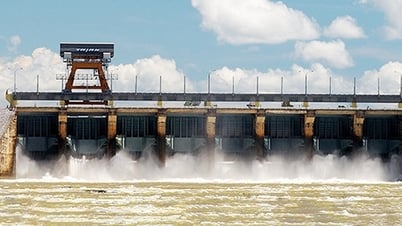China has just officially put into operation its first carbon-free highway, the 152.7 km Jinan-Hefei line.
Equipped with renewable energy systems, advanced tracking technology and modern design, the line will reduce net carbon emissions by about 9,000 tons per year. The Jinan-Hefei Expressway (G35), a flagship project in China's eco-friendly infrastructure development strategy, has officially been put into operation.
The route, developed by Shandong Hi-Speed Group (SDHS), is China's first carbon-neutral expressway, marking a milestone in efforts to build a sustainable transport system.

With a length of 152.7 km, this highway is upgraded and expanded with 8 lanes, a maximum speed of 120 km/h, 3 service stations, 2 parking areas and 10 toll stations.
Environmental friendliness plays a key role in the project, including the integration of renewable energy systems, energy-saving and carbon-neutral solutions, and integrated carbon-neutral control systems.
Distributed solar power systems, small wind turbines, geothermal heat pumps, energy storage, near-zero-energy buildings, off-grid micro-lighting systems, and forest carbon sinks are deployed to significantly reduce emissions.
The highway is estimated to emit about 13,600 tons of carbon annually. However, with the application of clean energy technologies, the route could eliminate up to 22,500 tons of emissions each year, reducing total net emissions by about 9,000 tons per year.
Solar panels are installed across the service area buildings, toll booths, access roads and embankments, including solar canopies over the parking garages. The system not only charges vehicles but also generates 33 GWh of electricity per year from its 30 MW capacity.
In addition, the expressway also integrates small wind turbines, geothermal heat pumps and distributed storage systems in service areas, with a total energy storage capacity of 9 MW/18 MWh. The mobile energy storage system ensures backup power supply for the microgrid.
In addition, the project includes energy-saving improvements, such as upgrading wastewater treatment systems, adopting standards for near-zero-energy buildings, and expanding green space to increase carbon sequestration.
Shandong Hi-Speed Group manages thousands of highway infrastructure with advanced tracking technology, using pile number identification and precise location algorithms for real-time monitoring, inspection and maintenance through a smart operation platform.
The Jinan-Hefei Expressway is a major step forward in China’s efforts to develop carbon-neutral highways. As China’s 184,000-km expressway network expands by 6,000 km and upgrades 3,000 km each year, the transition to carbon-neutral routes will play a key role in reducing emissions and advancing the country’s green energy goals.
(According to PV-Magazine)

Source: https://vietnamnet.vn/trung-quoc-dua-vao-hoat-dong-tuyen-duong-cao-toc-152km-sieu-dac-biet-2356188.html



![[Photo] Prime Minister Pham Minh Chinh starts construction of vital highway through Thai Binh and Nam Dinh](https://vphoto.vietnam.vn/thumb/1200x675/vietnam/resource/IMAGE/2025/5/12/52d98584ccea4c8dbf7c7f7484433af5)
![[Photo] Prime Minister Pham Minh Chinh works with the Standing Committee of Thai Binh Provincial Party Committee](https://vphoto.vietnam.vn/thumb/1200x675/vietnam/resource/IMAGE/2025/5/12/f514ab990c544e05a446f77bba59c7d1)
![[Photo] Buddha's Birthday 2025: Honoring the message of love, wisdom, and tolerance](https://vphoto.vietnam.vn/thumb/1200x675/vietnam/resource/IMAGE/2025/5/12/8cd2a70beb264374b41fc5d36add6c3d)


![[Photo] Explore the Great Wall of Water in the Suburbs of Beijing, China](https://vphoto.vietnam.vn/thumb/402x226/vietnam/resource/IMAGE/2025/5/5/c2e706533d824a329167c84669e581a0)


























































































Comment (0)